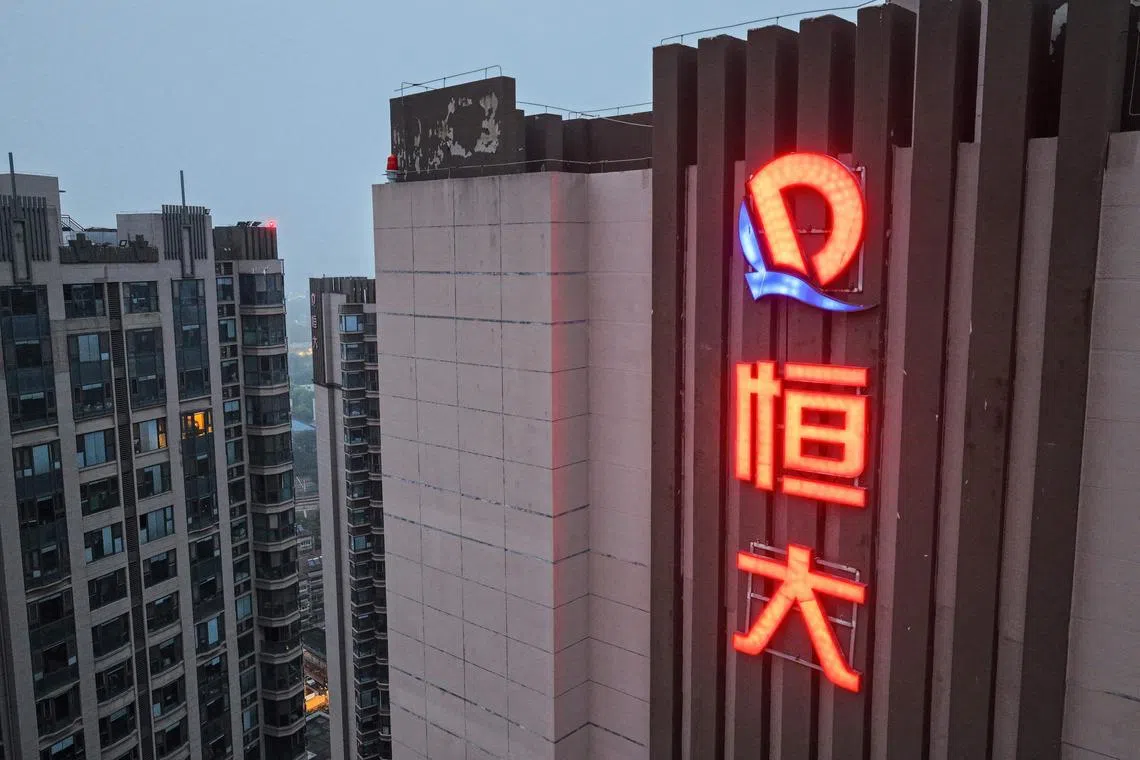This is the end of China’s once mightiest property firm
Sign up now: Get ST's newsletters delivered to your inbox

Evergrande will be remembered as a cautionary tale of unbridled debt-fuelled expansion whose collapse brought China’s financial system to the brink.
PHOTO: AFP
Alexandra Stevenson
Follow topic:
HONG KONG – The moment passed without fanfare. Evergrande, a real estate developer that once represented the pinnacle of China’s economic prowess, was formally removed from the Hong Kong Stock Exchange on Aug 25.
The company made its market debut in Hong Kong 16 years ago at a stock value of US$9 billion (S$11.5 billion). That grew more than fivefold to US$51 billion eight years later only to plummet to earth in recent years; it is now worth a meagre US$282 million.
Evergrande will be remembered as a cautionary tale of unbridled debt-fuelled expansion whose collapse brought China’s financial system to the brink.
The company tested Beijing’s long-time “too big to fail” policy towards its biggest companies. It shattered its tolerance of unchecked borrowing by giant corporations. And Evergrande’s collapse in 2021, under more than US$300 billion of debt, exposed the vulnerabilities of China’s economy and its dependence on real estate as a driver of growth.
Now what is left is the carcass of a corporate behemoth – 1,300 not-yet-finished real estate projects in more than 280 cities and hundreds of thousands of home buyers still waiting on their apartments. Then there is the long line of creditors, from businesses in China that worked for Evergrande to investors in London and New York who bet on it, still waiting to be repaid.
In 2024, a Hong Kong judge ordered Evergrande to be dismantled. She appointed Alvarez & Marsal, a firm that specialises in bankruptcies and once helped unwind Lehman Brothers, to do the task. A year and a half into the job, the liquidators, as Alvarez & Marsal is known, have made small steps towards helping overseas creditors get tiny slices of what they are due.
The latest publicly disclosed documents from Evergrande demonstrate the challenges.
Creditors have made hundreds of legal moves against Evergrande’s projects in China, and dozens of assets have been frozen. In some cases, investors or local governments have taken over developments. It is already difficult for the Hong Kong liquidators to reclaim assets for other creditors because of Evergrande’s complex business structure with thousands of subsidiaries.
To squeeze money out of what is left of Evergrande, the liquidators have to take over each subsidiary one at a time. Alvarez & Marsal has so far taken control of more than 100 companies and assets worth about US$3.5 billion.
But only about US$255 million of the US$45 billion that creditors in Hong Kong claim they are owed has been scrounged up. And the liquidators have warned that even the value of some of the seized assets is in question, casting “serious doubt on the amounts, if any, that may ultimately be realised for the benefit of the company’s creditors”.
The liquidators are pursuing another legal route to try to extract money from Evergrande: going after former chairman Hui Ka Yan, his wife Ding Yu Mei, and former Evergrande chief executive Xia Haijun. A case taking place in Hong Kong, with hearings that are closed to the public, has targeted US$6 billion of assets that Hui and other executives paid to themselves in the years after Evergrande’s Hong Kong public listing.
It is a study in the excess of a bygone era in China’s one-time freewheeling real estate industry. So far, the case has mostly focused on Hui’s wife and Xia. Hui was detained in 2023 and the authorities have since fined him US$6.5 million and accused him of “organising fraud”.
One recent filing to the court claimed that Xia, who was fined US$2 million and banned from financial markets by a top Chinese regulator for securities fraud, is hiding assets worth US$24 million in several houses and luxury cars in California.
One of those properties, in Irvine, is worth US$6.3 million and was bought in April 2022, one month after Evergrande suddenly delayed its annual results for 2021 and said US$2 billion in loans had been seized by banks, court documents show. Several months later, Xia resigned over what the company said had been a plan to funnel US$2 billion into one of its Hong Kong listed companies from a subsidiary.
Just a few months before Xia was fined in March 2024, his wife spent US$14.5 million on a sprawling mansion in Newport Beach, California, according to court filings. He has told the court he does not own anything worth more than US$6,400. NYTIMES

